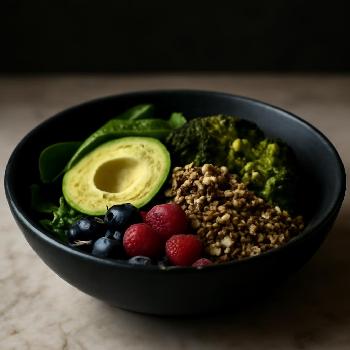Cooking Tips > Culinary Nutrition > Superfoods and Ingredients > What are some superfoods to include in my diet?
What are some superfoods to include in my diet?
Superfoods are nutrient-rich foods that offer significant health benefits. Incorporating them into your diet can boost your overall well-being. Here’s a guide to some standout superfoods and how to use them in your recipes. Use this tutorial to understand all the beneficts.

What Defines a Superfood?
Superfoods aren't defined by a specific scientific criterion, but generally they are foods rich in antioxidants, vitamins, minerals, and other beneficial compounds. They often have a high nutrient density relative to their caloric content.
Berries: Antioxidant Powerhouses
Berries, such as blueberries, strawberries, raspberries, and blackberries, are packed with antioxidants, which protect your cells from damage caused by free radicals. They are also a good source of fiber and vitamins. How to Include Them: * Add to smoothies and yogurt. * Use as a topping for oatmeal or cereal. * Bake into muffins or pancakes. * Enjoy as a snack on their own.
Leafy Greens: Vitamin and Mineral Rich
Leafy green vegetables like spinach, kale, collard greens, and Swiss chard are loaded with vitamins (A, C, K), minerals (iron, calcium), and fiber. They are low in calories but high in nutritional value. How to Include Them: * Add to salads. * Sauté as a side dish. * Blend into green smoothies. * Use in soups and stews.
Nuts and Seeds: Healthy Fats and Protein
Nuts and seeds like almonds, walnuts, chia seeds, flaxseeds, and pumpkin seeds provide healthy fats, protein, and fiber. They also contain essential minerals like magnesium and zinc. How to Include Them: * Snack on a handful of nuts or seeds. * Add to salads and yogurt. * Use in baking (e.g., muffins, granola). * Blend into smoothies or nut butter.
Fatty Fish: Omega-3 Fatty Acids
Fatty fish like salmon, tuna, mackerel, and sardines are excellent sources of omega-3 fatty acids, which are essential for brain health and reducing inflammation. They also provide high-quality protein and vitamin D. How to Include Them: * Bake, grill, or pan-fry for a main course. * Add to salads or sandwiches. * Use in sushi or poke bowls.
Legumes: Fiber and Protein Source
Legumes such as beans, lentils, and chickpeas are rich in fiber, protein, and iron. They promote digestive health and help regulate blood sugar levels. How to Include Them: * Add to soups, stews, and salads. * Make hummus or bean dips. * Use in vegetarian chili or tacos. * Roast chickpeas for a crunchy snack.
Whole Grains: Fiber and Nutrients
Whole grains like quinoa, oats, brown rice, and whole wheat contain fiber, vitamins, and minerals. They provide sustained energy and contribute to heart health. How to Include Them: * Use as a side dish (e.g., quinoa, brown rice). * Eat oatmeal for breakfast. * Use whole wheat flour for baking. * Add to salads and soups.
Avocados: Healthy Fats and Nutrients
Avocados are rich in healthy monounsaturated fats, fiber, and vitamins. They are known for their creamy texture and versatility in recipes. How to Include Them: * Add to salads and sandwiches. * Make guacamole. * Blend into smoothies. * Use as a spread on toast.
Tips for Incorporating Superfoods
Start small: Introduce one or two superfoods at a time to see how your body reacts. * Variety is key: Aim for a diverse range of superfoods to ensure you're getting a wide array of nutrients. * Don't rely solely on superfoods: They should complement a balanced diet that includes fruits, vegetables, lean proteins, and healthy fats. * Be mindful of portions: Even healthy foods should be consumed in moderation.
FAQ
-
Are superfoods a substitute for medication?
No, superfoods are not a substitute for medication or medical advice. They can be a part of a healthy lifestyle, but it's essential to consult with a healthcare professional for any health concerns. -
Can I eat too many superfoods?
Yes, moderation is important. While superfoods are nutrient-rich, consuming excessive amounts of any single food can lead to imbalances or digestive issues. A balanced diet is always best. -
Are organic superfoods better?
Organic superfoods are grown without synthetic pesticides and fertilizers, which can be beneficial. However, both organic and non-organic options can be nutritious.
